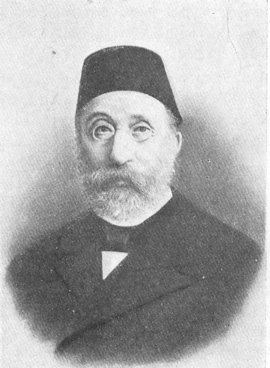
Midhat Pasha, a wise and just Turkish governor who laid the foundations of the Agricultural Bank and was useful to his Bulgarian subjects in many other ways
CHAPTER XVII
The big community chest
The Bulgarian Agrarian Bank is like none other on the face of the earth. Its capital belongs to nobody or rather it belongs to everybody, yet it has not come from the state. It is used ten times over in the course of a year but it keeps replenishing itself and is ever increasing. Nor can the bank ever go broke, since the state is behind it; yet it is not run by the Bulgarian state; it is autonomous. It has no shareholder and pays no dividends. It buys, sells, enlightens and uplifts and lends money to more than half the agriculturists in the country, practicing the astounding policy of letting its debtors "eat their cake and keep it too".
It is a school, a general store and a money lending shop. It began as a wooden box made secure by a big iron padlock and now possesses scores of fine buildings, one of which is among Sofia's most imposing edifices.
Its origin was the old fashioned community chests once found in many Bulgarian towns. In former times the Bulgarian peasants and artisans observed the custom of contributing regularly to a common fund, which was used to enable widows and other poor people to buy farm animals, tools, seeds and even the necessities of life. Three quarters of a century ago a progressive and energetic Turkish governor, Midhat Pasha, who administered the greater part of Bulgaria, took up this community chest idea and made it a regular part of his. system of government. And in the course of time quite a long time the institution developed into the best agricultural bank in Eastern Europe.

Midhat Pasha, a wise and just Turkish governor who laid
the foundations of the Agricultural Bank and was useful to his Bulgarian
subjects in many other ways
The chief circumstances which led Midhat Pasha to open his Self-Help Banks and which impelled other rulers of Bulgaria, especially after the liberation of the country, to improve and amplify the system were the terrible abuses committed by heartless usurers in the Bulgarian villages. And it is a sad fact that many of the most predaceous of these Shylocks were Bulgarians. They usually made from 50% to 500% profits and, worst of all, they often charged "green interest" on their short time loans, that is, they lent money or grain against growing crops, stipulating that a much larger number of pails of wheat be returned after the harvest. So on threshing day, after the horses, running round on the threshing floor, had tramped out the grain, and the peasant with his family had winnowed it in the wind and gathered it into a neat golden pile, the tax gatherer appeared to take his tenth and the usurer to receive his share. In many cases there was very little left for the poor peasant. He did not have enough to carry him through the winter and spring, so again he had to borrow from the money lender on outrageous terms. Thus he came to find himself overwhelmingly and inextricably in debt; the hopeless victim of his creditor. Do what he might there was no conceivable way for him to get on his feet again. There were scores of villages in which the usurers, who were often the saloon keepers, held practically all the peasants in their hands. In addition to this, at the middle of the last century the Turkish Empire was rocking with anarchy and rumbling with discontent clearly showing Midhat Pasha that some measure was necessary to prevent or postpone a general rebellion, so he founded Community Banks.
In the beginning, 70 years ago, the communities secured capital for their banks in two ways. In some cases the crops raised on the communal land were put into the fund and in others the richer farmers were compelled to contribute amounts of wheat and corn corresponding to the number of work animals they used. In other words, it was a special tax on capital, paid in kind and not in money. In the spring, when the price of cereals was the highest the accumulated grain was taken from the town granary and sold and the money was literally placed in the community chest, to be administered by four elderly and reliable men, usually two Turks and two Bulgarians. When as much as 800 dollars had been accumulated the Bank was permitted to begin business and once each week, on market day of course, the chest was unlocked, the bags of heavy gold coins untied and the account books laid upon a little table. If any one was in need he could appear before these four red fezzed, wide belted. baggy trousered bankers and ask for a loan, which he might hope to get at a reasonable interest for one year or less, that is in case a good neighbor of his was willing to go security or if he mortgaged a suitable amount of property. The mortgaging process was astoundingly brief and simple all he had to do was to put the deed for his property in the community chest and sign a promissory note. If he could not sign he merely wet his finger tip in ink and left his finger mark, which two literate neighbors attested was really his. If none of the four bankers could read, write or figure they engaged a clerk to keep the books for them, but they did not relinquish their vigil over the money bags. There was no connection between one community chest and the others, no central office nor clearing house. Each little bank with its quartette of directors was a separate, independent institution. The profits all went to the village contributing the capital and much of it was used for village improvement and for helping the needy.
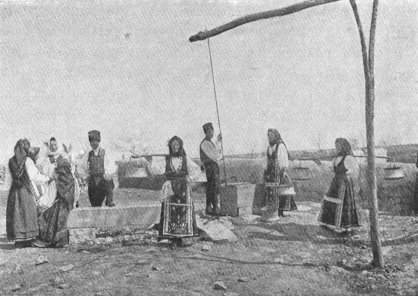
At the village well, on the level plain of Dobroudja
It is plain that this whole enterprise was crude and simple and undoubtedly the naive bankers made bad loans now and then. But the system was no joke and the community chest kept getting fuller and fuller so in time it came to be opened more than once a week.
The War of Liberation almost put an end to the whole undertaking, for when the Russians crossed the Danube River and the Balkan mountains, driving the Turks back toward Asia, the latter in their flight took many of the community chests with them, so that when the smoke of battle cleared away, some of the banks not only found themselves with empty chests but also with no records of their debtors and the sums owed. Nevertheless, the newly freed nation considered the Self-Help Banks a necessary institution and at once set about to reorganize them and to recover as much of the money, books and loans as possible. Villages were obliged to continue to contribute in kind, and had the privilege of electing the cashiers, who came to be one for each institution instead of four. Being a villager in many cases as well as a politician, the cashier did not always prove himself a brilliant banker. Nor did the rather haphazard old patriarchal system answer the growing needs and the somewhat more complicated economic situation. So in 1894 a new law was passed, uniting all the banks in a single system, under the control of the Ministry of Agriculture. After that money could be transferred from the chest of one town to that of another, all profits were retained by the banks not reverting to the villages and trained controllers were appointed to help the elective cashiers.
During the 37 years that have passed since then many other improvements have been made in the banks and the form they now have was given to them by the law of 1927. No longer are there agricultural banks but one Agricultural Bank with 98 branches and 58 agencies, situated in all parts of the country. The institution is managed by a governor and four administrators who are appointed by the King and cannot be dismissed except by vote of the National Assembly. Of the profits of the bank 85% go to increase the capital fund, and 15% for reserve capital, bonuses and salaries for the personnel. In no case may the bonus exceed 50% of an employee's salary which varies from 15 to 100 dollars monthly. Each branch is conducted by a treasurer, accountant and legal adviser. The branches and agencies loan money directly to individuals and to cooperative organizations.
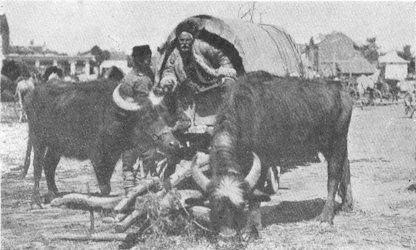
Bulgarian tractors they're so slow that, in comparison,
oxen seem like jackrabbits
Most of the peasant proprietors of Bulgaria have dealings with this institution. Last year, for example, 451,255 owners of farm property out of a total of 754,206 were given credit, some without security, many on the security of guarantors and others against mortgages. A new and very popular form of credit is known as warrant loans. These are given against grain, which is not removed from the villagers' granaries. The process of completing the transaction is rapid and simple. A bank agent visits the peasant who wants money, examines, measures and registers the produce to be used as security, officially informs the mayor of the village concerning the transaction and authorizes the bank to give the desired loan. From then on until the mortgaged wheat is sold the mayor is responsible for its remaining in the bin. The bank very seldom requires peasants to sell stock, furniture or real estate in order to pay their notes; it prefers to wait many years rather than foreclose a mortgage, giving its debtors every possible chance to recover. So closely is the life of the peasants tied up with this bank, that they are not allowed to sell any real estate without securing an official certificate stating that they are not indebted to it. Without that no property deeds are registered. The assets of the bank have more than doubled within the last five years and now exceed five billion levs or 36,000,000 dollars.
Within the last ten years the deposits in the bank have increased from 593,643,000 levs to well over four billion. Last year there were a million and a half transactions with a turnover of 45 billion levs, seven times as much as the whole state budget.
Not less than a dozen different kinds of very important activities are constantly carried on by the institution. One is the furnishing of modern agricultural implements to the peasants at cost prices on easy payments over a three years period. Most large machines such as tractors and threshers are supplied through the Peasant Cooperative Societies and in a village where a cooperative is working with such machines the bank does not furnish them to individuals. In all cases it strives to strengthen the cooperative movement.
The bank supplies seeds for new cultures, imports material for spraying vineyards and furnishes chemicals for fighting plant diseases.
In conjunction with cooperative organizations it provides for the drying and marketing of a large part of Bulgaria's production of silk cocoons.
It helps the cooperators to produce and sell rose oil. It finds markets for much of the Bulgarian tobacco. It aids in the construction of modern wine cellars and, most important of all, it gives credit to the peasants, last year lending more than four billion levs, of which 22% went for real estate, 20% for farm animals, 3% for machines, 4% for farm improvement, 12% to pay off debts and 19% for current needs for food.
The bank is endeavoring more and more to place these loans through peasant cooperatives. The founding, financing, and directing of such organizations are in fact one of its chief aims and activities. It is trying to reorganize the whole social and economic life of the Bulgarian village on the cooperative basis. Its gospel is cooperation; the good news which ifs representatives carry from village to village is "Peasants, cooperate". Furthermore it not only preaches a saving gospel, but shows the villagers how to put it into practice and furnishes them capital to start on.
In 1907 there were 254 peasant cooperative societies; now there are 1600 and their 225,000 members comprise more than 25% of all Bulgarian peasant proprietors.
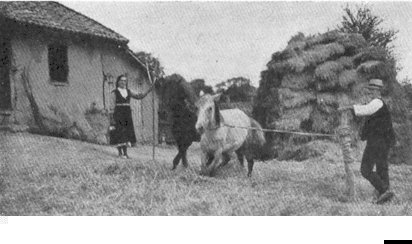
A threshing machine. After the merry-go-round finishes,
the man and his wife rake off the straw and winnow the grain in the wind
Most of these cooperatives are credit organizations existing to help the peasants secure loans for marketing their crops and improving agriculture. They will eventually become the channels through which money will pass from the Agricultural Bank into the villagers' hands; they will be the capillaries in the vital circulatory system of Bulgarian agriculture. There are also cooperatives for buying and selling, for making wine, manufacturing sugar, drying silk cocoons, lumbering, dairying and stock raising. One of the two largest light and power producing plants in Bulgaria is a cooperative enterprise. As is also the best conducted sugar factory. The only chain stores in Bulgaria are links in a cooperative undertaking, which has its own flour mills and factories. Much of Bulgaria's large output of excellent tobacco is sorted, treated and marketed by cooperatives. And many modern handicrafts have been reorganized on a cooperative basis.
One of the most popular forms of cooperation are the Popular Banks found now in all parts of Bulgaria. The first one was opened in 1903 in Sofia and already there are 237 of which half are found in the cities and the rest in the villages. They are supported mostly by small merchants and artisans, people who have need of liquid capital, of quick loans for short periods. Of the members of these banks 20% are craftsmen or small industrialists, 18% store keepers, 20% agriculturists and 18% state officials; 24% of the loans go to artisans and 30% to small merchants. These banks have. thriving savings accounts and are responsible for financing many public service enterprises. Many towns and villages owe their electric light systems to them.
They get their credit from the Bulgarian Cooperative Bank, which is a state institution and exists to furnish credit to the cooperatives not served by the Agricultural Bank, namely to those in the cities. This bank was founded in 1910 with a comparatively small original capital furnished entirely by the National and Agricultural Banks. In 1928 it obtained a supplementary capital of 150,000 pounds sterling from the refugee loan which Bulgaria received through the League of Nations. In addition to encouraging, founding and aiding city cooperatives, of which there are 1,694 in existence, this bank also provides for agricultural insurance against hail and natural calamities.
Now and then certain conflicts or misunderstandings have arisen among the Agricultural Banks, the Popular Banks and the Cooperative Bank, but they are of but little importance and now the three institutions have quite definitely worked out their separate spheres of activities and their special functions. The important thing is that they are all striving to outdo one another in service to the cause of cooperative enterprises. This is plainly one of the main channels in which the economic life of Bulgaria is to flow in the future. Cooperation is to be the method whereby villagers with an average of twelve acres of cultivated land to a family, artisans in little shops, merchants in small stores and industrialists in two-roomed factories are to win economic security, attain a decent standard of living and preserve their independence and consciousness of proprietorship. Bulgaria will not be filled with trusts soon. Trusts are advancing indeed, but their fields of conquest are very limited. There will be no great farms, no mass production. Little fields, little shops little houses, little stores will abound and abide; each person will have his place and his work, most creators will be both bosses and toilers and they will all go on their own, yet will work together in cooperative organizations.
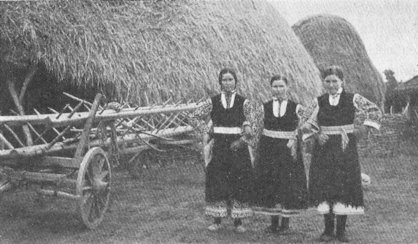
Well, we're ready!
The cooperative dwelling is a symbol of Bulgaria's economic and social life at the moment. Bulgarians are characterized by a passion for owning the houses they live in. They prefer to pay interest on mortgages rather than rent, so many of them have built apartments in giant apartment houses. They own their dwellings even though these form part of an immense common edifice. The big houses in Sofia are not the property of wealthy land lords but of cooperative groups of independent proprietors. Each cooperative apartment owner has borrowed money from a state bank against a mortgage to erect his dwelling and, though freed from taxation for ten years, he has heavy interest obligations to meet with inexorable regularity, yet he survives the worry and strain because he is paying for his own house.
Such is the nature of much of Bulgaria's economic activity. Small, modest, independent proprietors, working in cooperation, under the direction and with the aid of state institutions. The Bulgarian retains his individualism in his cooperation. Both tendencies are very marked in him and sometimes they conflict furiously, resulting in broken friendships and disrupted organizations. The reconciling of these impulses is one of the great tasks of the Bulgarian people. When they have produced complete harmony between them and attained effective discipline they will have solved their most fundamental economic and social problem and escaped the brazenness of riches, the squalor of poverty, the blight of heartless wheels and the double humiliation of hired toilers serving ail powerful masters. The old community chest is serving as the corner stone in the nation's economic structure.
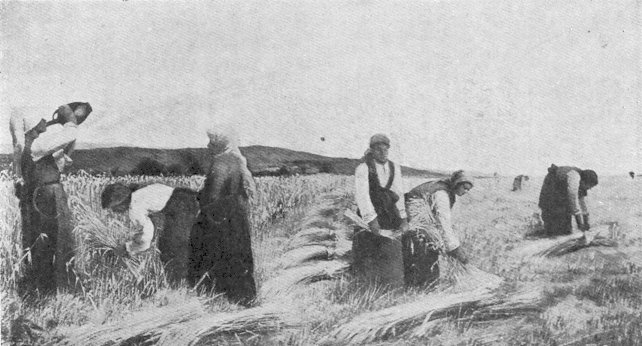
Painting by Ivan Angeloff
Harvest girls. Only you cant see their song
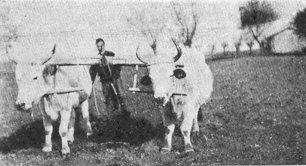
[Previous] [Next]
[Back to Index]